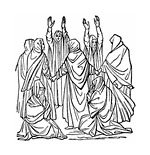
The Natural Law & Ritual Laws
THE LUMINOSITY OF MORAL TRUTH
In his book The Body of Faith: God and the People of Israel, Michael Wyschogrod, a distinguished Jewish theologian, writes the following: “alongside this unusual moral sensitivity, the Bible is also quite amoral.” He is referring to God’s order to Joshua to destroy the inhabitants of Canaan (Judges 1). Wyschogrod writes in another book, Abraham’s Promise: Judaism and Jewish-Catholic Relations: “Do I really understand why God wants me not to murder? I know that he does not want me to do it and that should be enough.”
He might well have written: “I do not understand why God prohibits the eating of pork, for it is written in Genesis 1:31 that when God had completed creation, ‘He saw all that He had made, and it was very good.'” This apparent discrepancy makes more sense: Why should certain animals be declared impure? The answer is simple: Ritual laws need not be intelligible. But murder is an altogether different matter.
Those of us who are convinced that there is a natural moral law — that is, God’s whispering to the human heart — are bound to be surprised upon reading such sentiments coming from the pen of a most devoted Jew. Is it true, we are led to ask, that the immorality of murder cannot be known except by divine prohibition? Likewise, if divine revelation is necessary in order to know that certain actions are evil, are those who have not received it exonerated? Cain’s murder of his brother, Abel (whose “blood cries to heaven,” Gen. 4:10), took place long before the Ten Commandments were given to Moses on Mount Sinai (Exod. 20). The evil deeds of men at the time of Noah triggered God’s anger and brought about the flood (Gen. 6-7). Once again, no formal moral revelation had been given them.
This leads us to one of the most poignant episodes in the Old Testament: God ordered Abraham to sacrifice his son, Isaac (Gen. 22). Is this not powerful evidence in defense of Wyschogrod’s argument that the Bible is amoral?
You May Also Enjoy
Thérèse saw the value of being little. She chose a way of humility, in which she gave her all to God and desired to be a weak, ordinary, "hidden," and unrecognized saint.
I identify five stages in the conversion process. Individuals may spend more time in one particular stage, but the stages are more or less common to all converts.
It is a mercy that we are not angels, that it is not our lot to give an eternal answer to God in the first moment of our existence.

